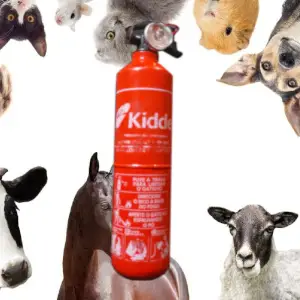As fire extinguisher technology grows more sophisticated, fire safety for people and their homes has become easier. But what about fire safety for pets, like cats and dogs? One of the most common questions is if fire extinguishers pose any danger to animals. For more, keep reading.
Can a Fire Extinguisher Kill a Dog?
Not likely. CO2 fire extinguishers that spray chemical powder will likely be very cold. This means a nearby dog will likely not lick it. If a dog does, it will not cause them to get sick if it is only a small amount.
Dry chemical fire extinguishers contain salts such as potassium or sodium bicarbonate. This can get into the dogs eyes and on its fur which is generally not good for it. Licking fire extinguisher powder can cause a dog to injure its toungue.
If dog is sprayed directly by a C02 fire extinguisher, the intense cold could damage their exposed tissue on their face and paws. If a dog is sprayed by a fire extinguisher, its a good idea to take them to a vet just in case.
If you own a little dog and spray it with a close up blast of a large fire extinguisher, or you drop the fire extinguisher on the dog, it could be killed.
Can a Fire Extinguisher Kill a Cat?
Like small dogs, cats can be killed by fire extinguishers if sprayed up close or it is dropped onto them. However, cats are usually quick to escape a dangerous situation so will not likely be nearby when a fire sparks. However, like dogs, cats have fur that can protect their skin from fire extinguisher spray, but it will need to be cleaned off.
If a cat, being so small, licks the powder it could become sick.
Can a Fire Extinguisher Kill a Snake?
Yes, snakes can be killed by fire extinguishers due to the high force of cold gas that is expelled. Snakes do not have fur and are rather small, and fire extinguisher spray can cause their body temperature to drop to a dangerous level.
Snakes rely on oxygen to breathe, and if there is enough carbon dioxide in the environment, snakes can suffocate. However, the snake may only become stunned by the extinguisher before quickly slithering off and getting out of danger.
Snakes are often found in places that are susceptible to fire, including:
- Old warehouses
- Garages
- Barns
- Sheds
- Wooden decks
If your intention is to stun a snake into lethargy, spraying it with a C02 fire extinguisher may work. This will allow you to remove it. Just make sure to not spray it indoors or in too small of a space or you will lose sight due to the fog.
The better idea may be to just contact your local pest or animal control service to catch the snake a remove it safely.
Can a Fire Extinguisher Kill a Mouse?
Yes, a fire extinguisher can kill a mouse through suffocation. However, this is a messy way of getting rid of of a mouse and mice have a tendency to escape when humans get nearby. So, trying to kill a mouse with a fire extinguisher may not be the best method. First, try mouse traps or call an exterminator.
Here are some good mouse traps that will do a better job…
Small Plastic Snap Mouse Traps – 6 Pack
Victor Classic Wood & Metal Snap Mouse Traps – 20 Pack
Humane Catch & Release Mouse Traps – 4 Pack
Can a Fire Extinguisher Kill a Rat?
Similar to small dogs, rats can be greatly harmed by a fire extinguisher. The compressed cold air and large amounts of powder can either kill them or make them very sick. It might be worth it to try to use a fire extinguisher on a rat.
Can a Fire Extinguisher Kill a Horse?
No. Horses are large animals, and a small amount of fire extinguisher spray will not kill them. However, they could get sick from it.
Barn fires are very serious because there is so much flammable material around. Saving your horses by letting them out of the barn is the first thing you should do if the fire gets out of control.
Keeping a fire extinguisher or two in your barn is always a good idea just in case a fire breaks out.
Chemicals That Can Kill Animals If Ingested or Inhaled
Just about any substance that is inhaled or ingested in large enough quantities by an animal can cause them to become sick. This includes even food and water.
However, many chemicals and substances pose a very real danger to animal health even in small quantities, such as:
- Antifreeze
- Fertilizer
- Glue
- Herbicides
- Battery acid
- Bleach
- Drain cleaner
- Medications and drugs
- Household cleaners and detergents
- Paint, sealants, and stains
- Paint thinners
- Rat Poison
- Salts for de-icing:
What To Do If Your Animal Ingests Fire Extinguisher Contents?
Call your local veterinarian and explain to them exactly what happened. They will likely ask to have you take your animal in to be checked out. Do not wait to do this, as an animal can become sick very fast from ingesting or inhaling the wrong substances.
In Closing
Fire extinguishers are very effective fire suppressant tools when used properly. However, they can cause health risks to animals if used in small quarters when one or more is present. Thus, it is important to keep aware of any animals nearby when you use a fire extinguisher.
NEXT UP: Can A Fire Extinguisher Freeze?

